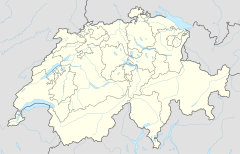Chillon Castle
| Château de Chillon | |
|---|---|

View from the north with the Dents du Midi in background
|
|
|
Location within Canton of Vaud
|
|
| General information | |
| Architectural style | Medieval |
| Classification | Historic monument |
| Town or city | Veytaux |
| Country | Switzerland |
| Coordinates | 46°24′51″N 6°55′39″E / 46.414167°N 6.9275°E |
Chillon Castle (French: Château de Chillon) is an island castle located on Lake Geneva (Lac Léman), south of Veytaux in the canton of Vaud. It is situated at the eastern end of the lake, on the narrow shore between Montreux and Villeneuve, which gives access to the Alpine valley of the Rhone. Chillon is amongst the most visited castles in Switzerland and Europe.
Chillon began as a Roman outpost, guarding the strategic road through the Alpine passes. The later history of Chillon was influenced by three major periods: the Savoy Period, the Bernese Period, and the Vaudois Period.
The oldest parts of the castle have not been definitively dated, but the first written record of the castle is in 1005. It was built to control the road from Burgundy to the Great Saint Bernard Pass From the mid 12th century, the castle was summer home to the Counts of Savoy, who kept a fleet of ships on Lake Geneva. The castle was greatly expanded in 1248 by Peter II.
During the 16th century Wars of Religion, it was used by the dukes of Savoy to house prisoners. Its most famous prisoner was probably François de Bonivard, a Genevois monk, prior of St. Victor in Geneva and politician who was imprisoned there in 1530 for defending his homeland from the dukes of Savoy.
Over his six-year term, de Bonivard paced as far as his chain would allow, and the chain and rut are still visible. He was rescued in 1536 by his countrymen and Bernese, who took the castle by force. The prison was residence for Bernese bailiff until Chillon was converted into a state prison in 1733.
In 1798, the French-speaking canton of Vaud drove out the German-speaking Bernese authorities and declared the Lemanic Republic. The Vaudois invited in French troops to help them maintain autonomy from the other Swiss. When the French moved in and occupied, Chillon was used as a munitions and weapons depot.
...
Wikipedia


